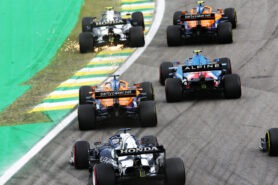Turbulence
Turbulence is a term used in Formula 1 Grand Prix racing to describe the complex and unpredictable airflow that surrounds and interacts with a race car as it travels at high speeds. It is caused by a combination of factors such as the shape of the car's body, the speed and direction of the wind, and the track conditions.
The term turbulence is often used in two different contexts in F1 racing:
Aerodynamic Turbulence:
Aerodynamic turbulence refers to the airflow that is created by the race car's body and wings as it moves through the air. This airflow can be either laminar (smooth and streamlined) or turbulent (chaotic and unpredictable). In F1 racing, teams design their cars to create specific types of aerodynamic turbulence that can generate downforce to increase grip and cornering speed. However, if the aerodynamic turbulence is too turbulent, it can lead to drag, instability, and loss of performance.
Track Turbulence:
Track turbulence is the airflow that is caused by the interaction of the race car with the surrounding environment, such as other cars, barriers, and grandstands. This can create unpredictable gusts of wind and turbulent air pockets that can affect the handling of the car, especially at high speeds. Drivers need to anticipate and adjust their driving style to cope with these changes in track turbulence.
Turbulence can have a significant impact on the performance of an F1 car, and teams invest heavily in understanding and optimizing their aerodynamic designs to minimize its negative effects. This includes using wind tunnels, computer simulations, and advanced sensors to measure and analyze the airflow around the car. Additionally, drivers and their teams use real-time telemetry data and on-board sensors to monitor and adjust to changes in track turbulence during a race.
Turbulence is a critical concept in Formula 1 racing, and it refers to the complex and dynamic interaction of airflow with the race car and its environment. It is a major factor that influences the aerodynamics, handling, and performance of an F1 car, and teams invest significant resources in understanding and optimizing it to gain a competitive advantage.












LAST 3 F1 Fan COMMENTS